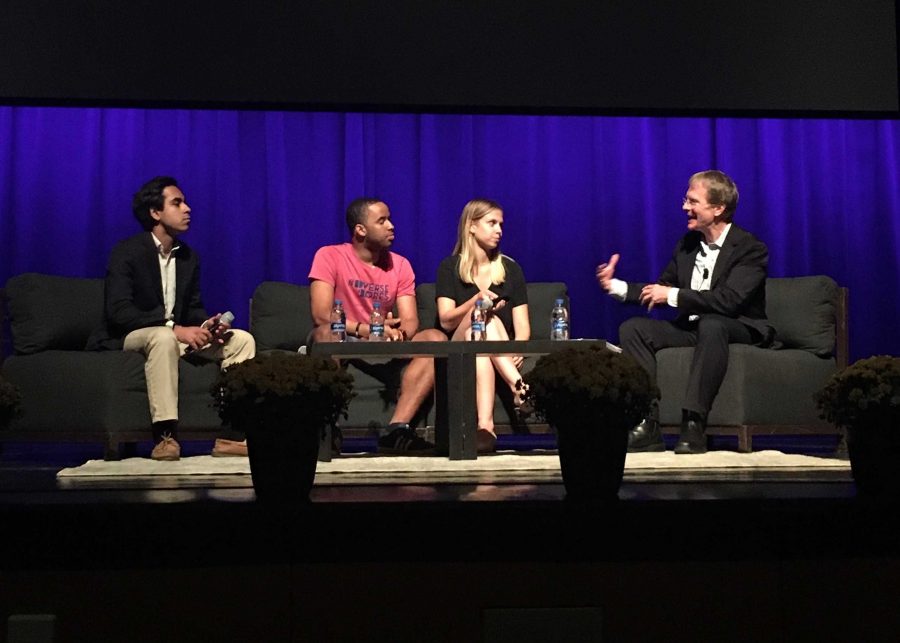When Dr. Ted Fischer was chosen to give the 12th annual Lawson Lecture to Vanderbilt’s class of 2022, he was asked to respond to this year’s Ingram Commons reading, Jonathan Haidt’s The Happiness Hypothesis, and speak on the subject of happiness.
He decided to turn that idea on its head to discuss wellbeing. That also happens to be the topic of his most recent book, The Good Life: Aspiration, Dignity, and the Anthropology of Wellbeing, which he published in 2014.
“Wellbeing is slightly different from happiness,” Fischer said. “The gist of my point is that we have a sense of well-being, and this is what Thomas Jefferson meant when he was talking about the pursuit of happiness. He wasn’t talking about American style, ‘are you having a good time right now,’ he was talking about long-term life satisfaction. A meaningful life, a fulfilled life, a life worth living.”
Fischer envisions the Lawson Lecture as a counterpart to the commencement speech that students hear at their graduation. He wanted to leave the freshmen who attend his remarks with an idea of how to make their next four years at Vanderbilt matter.
“The goal for you guys and gals at this point in your life is to try and align your short term goals with your long term life satisfaction. I got off the rails in college early on by indulging in momentary pleasures, and not in my lifetime calling,” Fischer said. “And what you really want to do is sort of have those two converge. That’s the secret to life. The good life and well being is not only about happiness, not only about money, but the most important thing is committing yourself to a larger project.”
Fischer doesn’t think that larger project has to mean saving the world. He wants students to define their purpose in life as they see fit.
“It doesn’t have to be grand, and it doesn’t have to be lofty,” Fischer said. “Committing yourself to something that is beyond your own self interest is the most important thing.”
Dr. Ted Fischer discovered his passion in life in an atypical way: by being kicked out of college during his sophomore year.
“I partied too much my first year or two of school…my parents as part of a rehabilitative measure offered to send me down as the photographer on a church trip to Guatemala, and everything about Guatemala sort of enchanted me,” Fischer said. “I came back and took an anthropology class and everything just sort of seemed to click, so I went on to graduate school and became an anthropologist.”
Fischer has gone on to a distinguished career in Anthropology, including publishing multiple books, teaching undergraduates at Vanderbilt since 1996 and founding the nonprofit organization Mani+ to combat malnutrition in Guatemala. Yet, he still acknowledges his luck in finding his passion so naturally.
“I think for most people there’s not a lightning bolt moment like I had, where everything becomes crystal clear, and I think sometimes these days we kind of set young people up to expect that,” Fischer said. “‘Find your passion,’ right, and it’s hiding under a rock and one day you’re gonna lift up that rock and, oh my god, and most of the time it’s not really like that. We make our passion as much as find it.”
Langford Auditorium filled up with freshmen on Sunday night who sat with their Visions groups to hear Fischer speak. After an introduction from Interim Commons Dean Gregory Melchor-Barz, Fischer spoke for about forty minutes and then held a brief question-and-answer session with three student VUCeptors.
Freshman attendees were engaged by his advice, which ranged from explaining how to win arguments by taking each issue back to first principles, imploring students to learn a foreign language, and saying that people shouldn’t stress so much about being happy.
“I thought it was really interesting that he mentioned how happiness isn’t the ultimate goal, how you want to be human above it all because being happy, sad, frustrated, is all a part of life,” said freshman Eva Herr. “That can keep things in perspective when you’re going through tough times and you realize okay, this is all part of the journey, this is all part of how you get to that final lasting happiness in life.”
It’s the perfect time for students to hear about finding their passions and defining their values in life, not just because these remarks come at the beginning of a crucial four years for finding who they are. Fischer believes that, in 2018, having clearly defined values and long-term goals is more important than ever.
“We’re living in a very consequential moment right now,” Fischer said. “We’re painfully giving birth to this new world order that we don’t understand yet. A lot of this rests on your generation, This is gonna be your world, and nobody knows what it looks like right now, and so I think your generation being much more value driven than my generation was offers us hope.”



